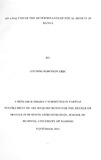| dc.description.abstract | Fiscal deficit gives the signal to the government about the total borrowing requirements from all sources. The primary component of fiscal deficit includes revenue deficit and capital expenditure. Budget deficits are generated when governments spend more money than they take in from taxes and other sources of revenue. This study sought to establish the determinants of fiscal deficit in Kenya. The study was guided by one objective which was to analyze the determinants of fiscal deficits in Kenya.
The study used a case of the Kenya Government budget, covering a period of 9 years from the financial year 2002/2003 to 2010/2011. Secondary data was collected from the Ministry of Finance and Kenya National Bureau of statistics. Panel data methodology was used in the analysis since cross-sectional and time series were combined. The data collected was analyzed using regression analysis.
From the findings 84.3% of fiscal deficits in Kenya was attributed to combination of the nine independent factors (expenditure, income, domestic borrowing, external borrowing, money supply, previous year’s consumption, civil servant salaries, inflation rate, and corporations receipts) investigated in this study.
Fiscal deficit is not dependent on any variable amounted to 1.143 Million. The data findings analyzed also shows that taking all other independent variables at zero, a unit increase in government expenditure will lead to a 0.635 increase in fiscal deficit. A unit increase in income will lead to a 0.235 increase in fiscal deficit; a unit increase in domestic borrowing will lead to a 0.451 increase in fiscal deficit; a unit increase in external borrowing will lead to a 0.825 increase in fiscal deficit. A unit increase in money supply will lead to a 0.354 increase in fiscal deficit; a unit increase in previous year consumption will lead to a 0.118 increase in fiscal deficit; a unit increase in civil servants salaries will lead to a 0.394 increase in fiscal deficit, a unit increase in inflation rate will lead to a 0.794 increase in fiscal deficit; and a unit increase in corporate receipts will lead to a 0.198 increase in fiscal deficit. This infers that external borrowing contribute more to
v
the fiscal deficit followed by inflation rate and least by previous year consumption and corporate receipts. | en_US |

